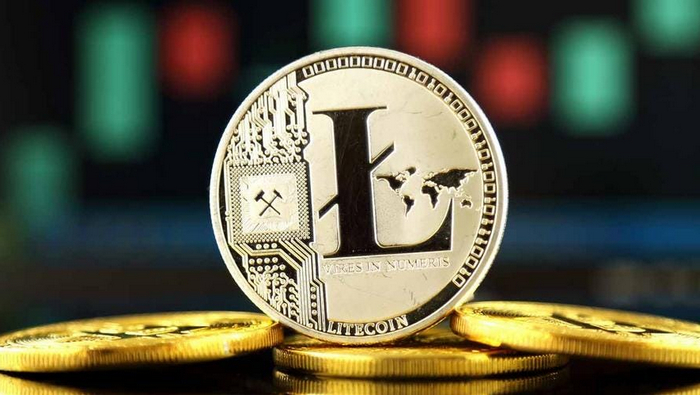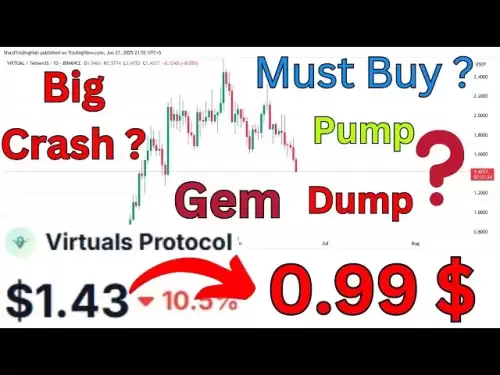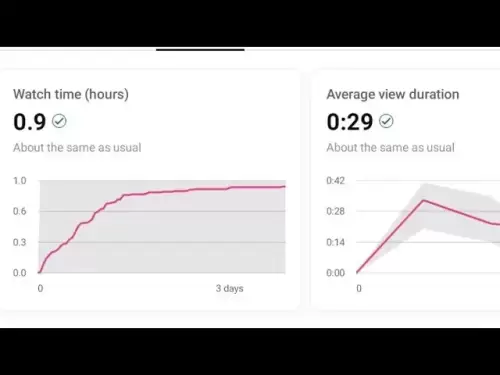-
 Bitcoin
Bitcoin $103,456.1111
0.49% -
 Ethereum
Ethereum $2,414.9631
0.02% -
 Tether USDt
Tether USDt $1.0006
0.05% -
 XRP
XRP $2.1083
0.24% -
 BNB
BNB $634.8760
-0.76% -
 Solana
Solana $139.8437
1.94% -
 USDC
USDC $0.9998
-0.01% -
 TRON
TRON $0.2737
0.97% -
 Dogecoin
Dogecoin $0.1602
0.20% -
 Cardano
Cardano $0.5737
1.08% -
 Hyperliquid
Hyperliquid $32.9779
-2.54% -
 Bitcoin Cash
Bitcoin Cash $474.8886
-1.80% -
 Sui
Sui $2.6272
-1.99% -
 Chainlink
Chainlink $12.4878
0.14% -
 UNUS SED LEO
UNUS SED LEO $8.9234
0.35% -
 Stellar
Stellar $0.2411
-0.18% -
 Avalanche
Avalanche $17.0274
-0.70% -
 Toncoin
Toncoin $2.8936
-1.11% -
 Shiba Inu
Shiba Inu $0.0...01112
-0.58% -
 Litecoin
Litecoin $82.6982
1.33% -
 Hedera
Hedera $0.1423
-0.05% -
 Monero
Monero $314.8455
3.26% -
 Ethena USDe
Ethena USDe $1.0006
0.01% -
 Polkadot
Polkadot $3.4043
1.14% -
 Dai
Dai $0.9999
0.01% -
 Bitget Token
Bitget Token $4.2848
-0.13% -
 Uniswap
Uniswap $6.8748
-5.45% -
 Pepe
Pepe $0.0...09661
0.52% -
 Pi
Pi $0.5359
1.19% -
 Aave
Aave $242.9168
-1.03%
How to buy and sell Litecoin? Which exchanges have Litecoin been listed on?
To sell Litecoin, choose an exchange that supports it, create an account, transfer your Litecoin to the exchange, place a sell order, and then withdraw your funds.
Oct 10, 2024 at 04:30 am

How to Buy and Sell Litecoin
1. Choose a reputable cryptocurrency exchange.
There are many cryptocurrency exchanges available, but not all of them support Litecoin. Some of the most popular exchanges that list Litecoin include:
- Coinbase
- Binance
- Kraken
- Gemini
- FTX
2. Create an account on the exchange.
Once you have chosen an exchange, you will need to create an account. This will usually involve providing your name, email address, and a password. You may also need to verify your identity by providing a government-issued ID.
3. Fund your account.
Once your account is created, you will need to fund it with funds in order to buy Litecoin. You can do this by depositing cryptocurrency from another wallet or by purchasing cryptocurrency with a credit or debit card.
4. Buy Litecoin.
Once your account is funded, you can buy Litecoin by searching for it on the exchange and placing an order. You will need to specify how much Litecoin you want to buy and the price you are willing to pay.
5. Store your Litecoin.
Once you have purchased Litecoin, you will need to store it in a digital wallet. There are many different types of wallets available, so you should choose one that is reputable and secure.
Selling Litecoin
1. Choose an exchange that supports Litecoin.
If you want to sell Litecoin, you will need to choose an exchange that supports it. The same exchanges that allow you to buy Litecoin also allow you to sell it.
2. Create an account on the exchange.
If you do not already have an account on the exchange, you will need to create one. Follow the steps in step 1 above.
3. Transfer your Litecoin to the exchange.
If your Litecoin is not already stored on the exchange, you will need to transfer it from your wallet to the exchange.
4. Sell your Litecoin.
Once your Litecoin is on the exchange, you can sell it by searching for it and placing an order. You will need to specify how much Litecoin you want to sell and the price you are willing to accept.
5. Withdraw your funds.
Once you have sold your Litecoin, you can withdraw your funds from the exchange to your bank account or another wallet.
Disclaimer:info@kdj.com
The information provided is not trading advice. kdj.com does not assume any responsibility for any investments made based on the information provided in this article. Cryptocurrencies are highly volatile and it is highly recommended that you invest with caution after thorough research!
If you believe that the content used on this website infringes your copyright, please contact us immediately (info@kdj.com) and we will delete it promptly.
- Ethereum Price Under Bearish Pressure: Analyzing the Sell Volume Surge
- 2025-06-22 06:45:12
- Texas, Bitcoin, and the Reserve: A Lone Star State of Digital Finance
- 2025-06-22 06:45:12
- Ruvi AI: The Next Binance Coin?
- 2025-06-22 07:05:12
- Navigating the Crypto Storm: Bitcoin, Ethereum, XRP, and the Bearish Sentiment
- 2025-06-22 06:25:12
- XRP ETF Approval: A Cryptocurrency Game Changer?
- 2025-06-22 06:25:12
- Texas Bitcoin Reserve: Adoption, Regulation, and the Lone Star State's Crypto Ambitions
- 2025-06-22 06:55:12
Related knowledge

How to customize USDT TRC20 mining fees? Flexible adjustment tutorial
Jun 13,2025 at 01:42am
Understanding USDT TRC20 Mining FeesMining fees on the TRON (TRC20) network are essential for processing transactions. Unlike Bitcoin or Ethereum, where miners directly validate transactions, TRON uses a delegated proof-of-stake (DPoS) mechanism. However, users still need to pay bandwidth and energy fees, which are collectively referred to as 'mining fe...

USDT TRC20 transaction is stuck? Solution summary
Jun 14,2025 at 11:15pm
Understanding USDT TRC20 TransactionsWhen users mention that a USDT TRC20 transaction is stuck, they typically refer to a situation where the transfer of Tether (USDT) on the TRON blockchain has not been confirmed for an extended period. This issue may arise due to various reasons such as network congestion, insufficient transaction fees, or wallet-rela...

How to cancel USDT TRC20 unconfirmed transactions? Operation guide
Jun 13,2025 at 11:01pm
Understanding USDT TRC20 Unconfirmed TransactionsWhen dealing with USDT TRC20 transactions, it’s crucial to understand what an unconfirmed transaction means. An unconfirmed transaction is one that has been broadcasted to the blockchain network but hasn’t yet been included in a block. This typically occurs due to low transaction fees or network congestio...

How to check USDT TRC20 balance? Introduction to multiple query methods
Jun 21,2025 at 02:42am
Understanding USDT TRC20 and Its ImportanceUSDT (Tether) is one of the most widely used stablecoins in the cryptocurrency market. It exists on multiple blockchain networks, including TRC20, which operates on the Tron (TRX) network. Checking your USDT TRC20 balance accurately is crucial for users who hold or transact with this asset. Whether you're sendi...

What to do if USDT TRC20 transfers are congested? Speed up trading skills
Jun 13,2025 at 09:56am
Understanding USDT TRC20 Transfer CongestionWhen transferring USDT TRC20, users may occasionally experience delays or congestion. This typically occurs due to network overload on the TRON blockchain, which hosts the TRC20 version of Tether. Unlike the ERC20 variant (which runs on Ethereum), TRC20 transactions are generally faster and cheaper, but during...

The relationship between USDT TRC20 and TRON chain: technical background analysis
Jun 12,2025 at 01:28pm
What is USDT TRC20?USDT TRC20 refers to the Tether (USDT) token issued on the TRON blockchain using the TRC-20 standard. Unlike the more commonly known ERC-20 version of USDT (which runs on Ethereum), the TRC-20 variant leverages the TRON network's infrastructure for faster and cheaper transactions. The emergence of this version came as part of Tether’s...

How to customize USDT TRC20 mining fees? Flexible adjustment tutorial
Jun 13,2025 at 01:42am
Understanding USDT TRC20 Mining FeesMining fees on the TRON (TRC20) network are essential for processing transactions. Unlike Bitcoin or Ethereum, where miners directly validate transactions, TRON uses a delegated proof-of-stake (DPoS) mechanism. However, users still need to pay bandwidth and energy fees, which are collectively referred to as 'mining fe...

USDT TRC20 transaction is stuck? Solution summary
Jun 14,2025 at 11:15pm
Understanding USDT TRC20 TransactionsWhen users mention that a USDT TRC20 transaction is stuck, they typically refer to a situation where the transfer of Tether (USDT) on the TRON blockchain has not been confirmed for an extended period. This issue may arise due to various reasons such as network congestion, insufficient transaction fees, or wallet-rela...

How to cancel USDT TRC20 unconfirmed transactions? Operation guide
Jun 13,2025 at 11:01pm
Understanding USDT TRC20 Unconfirmed TransactionsWhen dealing with USDT TRC20 transactions, it’s crucial to understand what an unconfirmed transaction means. An unconfirmed transaction is one that has been broadcasted to the blockchain network but hasn’t yet been included in a block. This typically occurs due to low transaction fees or network congestio...

How to check USDT TRC20 balance? Introduction to multiple query methods
Jun 21,2025 at 02:42am
Understanding USDT TRC20 and Its ImportanceUSDT (Tether) is one of the most widely used stablecoins in the cryptocurrency market. It exists on multiple blockchain networks, including TRC20, which operates on the Tron (TRX) network. Checking your USDT TRC20 balance accurately is crucial for users who hold or transact with this asset. Whether you're sendi...

What to do if USDT TRC20 transfers are congested? Speed up trading skills
Jun 13,2025 at 09:56am
Understanding USDT TRC20 Transfer CongestionWhen transferring USDT TRC20, users may occasionally experience delays or congestion. This typically occurs due to network overload on the TRON blockchain, which hosts the TRC20 version of Tether. Unlike the ERC20 variant (which runs on Ethereum), TRC20 transactions are generally faster and cheaper, but during...

The relationship between USDT TRC20 and TRON chain: technical background analysis
Jun 12,2025 at 01:28pm
What is USDT TRC20?USDT TRC20 refers to the Tether (USDT) token issued on the TRON blockchain using the TRC-20 standard. Unlike the more commonly known ERC-20 version of USDT (which runs on Ethereum), the TRC-20 variant leverages the TRON network's infrastructure for faster and cheaper transactions. The emergence of this version came as part of Tether’s...
See all articles
























































































